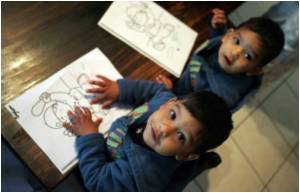The distant voices of children at play travel down long, empty corridors at Lao Song Elementary School in downtown Taipei, like faint echoes of a past when thousands of pupils packed the buildings.

"Some students would attend classes in the morning, others in the afternoon. They had to line up for the toilet. They had to line up for everything," said Chien Yi-jung, the school's principal.
"But in recent years, we've been cutting the number and size of the classes. People aren't having as many children as before," she said.
Throughout the region, a baby boom that had politicians worrying about having too many mouths to feed has turned into a baby bust that could potentially be just as devastating.
In the middle of the 20th century, the average woman in East Asia had 5.42 children, but that figure has dropped steeply to just 1.72 today, according to United Nations figures.
The societies of East Asia are among the most crowded in the world, leading some to welcome declining birth rates for their benefit on the strained environment.
Advertisement
In Japan, births fell below the replacement level in the 1970s, and that is one trend that neighbouring nations do not want to repeat.
Advertisement
The government forecasts the nation's population will more than halve to 60 million by 2100 unless it can persuade citizens to have more children.
And Japan, in common with other East Asian countries such as South Korea, has no history of large-scale immigration to replenish its dwindling numbers.
In South Korea, politicians are starting to worry aloud about the survival of the nation, in stark contrast to their past encouragement of birth control.
"It is a quasi-emergency situation," South Korean Health Minister Jeon Jae-Hee said last year.
"If the low birth rate continues, the nation will no longer be able to exist, with all four state insurance systems set to malfunction."
Jeon's ministry is cracking down on abortion providers, and is turning off the lights in its offices early once a month to encourage staff to go home and make more babies.
The government of Taiwan has offered one million Taiwan dollars (31,250 US dollars) for a catchy slogan that could convince young couples about the blessings of parenthood.
Even in China, famous for its draconian one-child policy, some demographers warn that it is time to begin urging people to have more children in the world's most populous nation.
"Although the public and the policy makers have started paying attention to the problem of the low birth rate, it's still not sufficient," said Chen Ming, a professor of population studies at Xiamen University in southeast China.
"People don't worry enough because the consequences, in the form of a declining and ageing population, only become obvious after 40 or 50 years."
Asian governments including in Japan, Singapore and South Korea have opted for financial incentives, trying to pay couples to have more children. Taiwan is looking at following suit.
But many Japanese households with toddlers complain that the country does not offer enough day-care centres, deterring mothers from working and exacerbating the paucity of taxpayers able to prop up a greying society.
And money will not solve everything. Many of the region's young have a new outlook on life, and are in no hurry to procreate.
Singaporean Simren Panoo, a 24-year-old events manager, says she does not plan to follow her parents' example of settling down early to have a family.
"Young people are really beginning to enjoy life and our version of (life) is different from the older generation's," she said.
"We want to enjoy life a little bit first, travel, socialise, and move up in our career first before having kids."
Source-AFP
TAN











